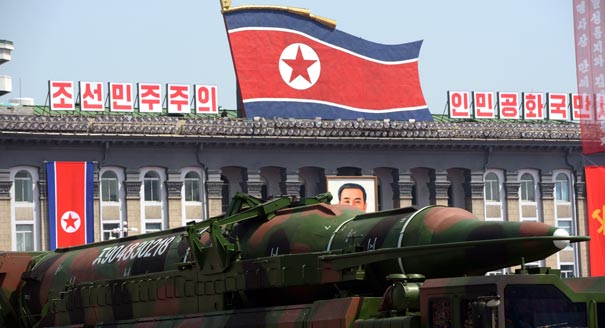Registration
You will receive an email confirming your registration.
2013 witnessed new levels of threatening behavior from North Korea: a satellite launch that could portend an improved long-range ballistic missile capability; a third nuclear test; and declarations that the Korean peninsula would witness “an all-out war, a nuclear war.” Recent perturbations among the North Korean leadership also raise the possibility of greater instability and unpredictability. What will 2014 bring in terms of North Korean nuclear behavior?
The Carnegie Endowment for International Peace and the Asan Institute for Policy Studies hosted a discussion on what to expect from North Korea on nuclear matters in 2014. Five experts discussed the status of North Korea’s nuclear activities, what negotiating tactics North Korea might attempt, and whether there are lessons to be drawn in managing North Korea’s nuclear ambitions from the Iranian and South Asian experiences.
Toby Dalton
Toby Dalton is the deputy director of the Nuclear Policy Program at the Carnegie Endowment for International Peace. His research focuses on cooperative nuclear security initiatives and nuclear challenges in South Asia and East Asia.
Choi Kang
Choi Kang is a senior research fellow and the vice president for research at the Asan Institute for Policy Studies. He was previously the dean of Planning and Assessment at the Korea National Diplomatic Academy.
Joel Wit
Joel Wit is a visiting scholar at the US-Korea Institute at SAIS and a senior research fellow at Columbia University Weatherhead Institute for East Asian Studies.
Park Jiyoung
Park Jiyoung is a research fellow and director of the Science and Technology Policy Center at the Asan Institute for Policy Studies. Park was previously managing director of the Research and Development Feasibility Analysis Center at the Korea Institute of S&T Evaluation and Planning.
Shin Chang-Hoon
Shin Chang-Hoon is a research fellow and the director of the International Law and Conflict Resolution Department at the Asan Institute for Policy Studies. He is also the director of the Asan Nuclear Policy and Technology Center.
James L. Schoff
James L. Schoff is a senior associate in the Carnegie Asia Program. His research focuses on U.S.-Japanese relations and regional engagement, Japanese politics and security, and the private sector’s role in Japanese policymaking.
Go Myong-Hyun
Go Myong-Hyun is a research fellow and the director of the Center for Risk, Information, and Social Policy at the Asan Institute for Policy Studies. Go’s research focuses on social networks, complex social interactions over space, and geospatial modeling of disease.
